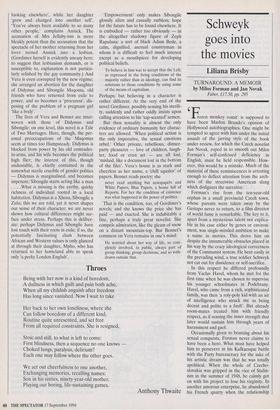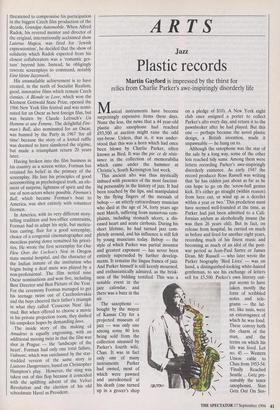Schweyk goes into the movies
Liliana Brisby
TURNAROUND: A MEMOIR by Milos Forman and Jan Novak Faber, £17.50, pp. 295
ozen monkey vomit' is supposed to have been Marlon Brando's opinion of Hollywood autobiographies. One might be tempted to agree with him under the initial assault of the jarring style of the book under review, for which the Czech novelist Jan Novak, roped in to smooth out Milos Forman's self-confessed deficiency in English, must be held responsible. How- ever, this would be a mistake. Much of the material of these reminiscences is arresting enough to deflect attention from the arch- ness of the streetwise American slang which disfigures the narrative.
Forman's rise from the ten-year-old orphan in a small provincial Czech town, whose parents were taken away by the Gestapo never to return, to a film director of world fame is remarkable. The key to it, apart from a mysterious talent not explica- ble in his case either by genes or environ- ment, was single-minded ambition to make a name in movies. This drove him on despite the innumerable obstacles placed in his way by the crazy ideological correctness of the Communist system. He bent easily in the prevailing wind, a true soldier Schweyk not cut out for dissidence or self-sacrifice.
In this respect he differed profoundly from Vaclav Havel, whom he met for the first time when he was chosen to supervise his younger schoolmates in Podebrany. Havel, who came from a rich, sophisticated family, was then 'a roly-poly kid with an air of intelligence who struck me as being decent and polite to a fault'. But already room-mates treated him with friendly respect, as if sensing the inner strength that later would sustain him through years of harassment and gaol.
Occasionally given to boasting about his sexual conquests, Forman never claims to have been a hero. What must have helped him to persevere in his Kafkaesque battle with the Party bureaucracy for the sake of his artistic dream was that he was totally apolitical. When the whole of Czecho- slovakia was gripped in the vice of Stalin- ism in the summer of 1948, he calmly got on with his project to lose his virginity. In another amorous enterprise, he abandoned his French quarry when the relationship r threatened to compromise his participation in the biggest Czech film production of the decade, Grandpa Automobile. When Alfred Radok, his revered mentor and director of the original, internationally acclaimed show Laterna Magica, was fired for 'Jewish expressionism', he decided that the show of solidarity which Radok expected from his closest collaborators was a 'romantic ges- ture' beyond him. Instead, he obligingly rewrote screenplays to command, notably Eine kleine Jazzmusik.
His unassailable achievement is to have created, in the teeth of Socialist Realism, good, innovative films which remain Czech classics. A Blonde in Love, which won the Klement Gottwald State Prize, opened the 1966 New York film festival and was nomi- nated for an Oscar as best foreign film, but was beaten by Claude Lelouch's Un Homme et une Femme. The delightful Fire- man's Ball, also nominated for an Oscar, was banned by the Party in 1967 'for all time' because the story of a looted raffle was deemed to have slandered the regime, but made a triumphant return 20 years later.
Having broken into the film business in his country as a screen writer, Forman has retained his belief in the primacy of the screenplay. He lists his principles of good screenwriting as psychological truth, an ele- ment of surprise, lightness of spirit and the use of non-actors where possible. Fireman's Ball, which became Forman's boat to America, was shot entirely with volunteer firemen.
In America, with its very different story- telling tradition and box-office constraints, Forman had to adapt his style, but meticu- lous casting, flair for a good screenplay, choice of a congenial cinematographer and merciless paring down remained his priori- ties. He wrote the first screenplay for One Flew Over the Cuckoo's Nest in Oregon state mental hospital, and the character of the Indian inmate of the institution who feigns being a deaf mute was played by a non-professional. The film netted nine Oscar nominations and won five, including Best Director and Best Picture of the Year. For the ceremony Forman managed to get his teenage twins out of Czechoslovakia and the boys cheered their father's triumph in what they called 'Couscous Next' like mad. But when offered to choose a movie in his private projection room, they dashed his unspoken hopes by demanding Jaws. The inside story . of the making of Amadeus is equally engrossing, with an additional moving twist in that the film was shot in Prague — the 'landscape of the heart'. Forman had only one total failure, Valmont, which was outclassed by the star- studded version of the same story in Liaisons Dangereuses, based on Christopher Hampton's play. However, the sting was taken out of this flop because it coincided with the uplifting advent of the Velvet Revolution and the election of his old schoolmate Havel as President.



























































 Previous page
Previous page